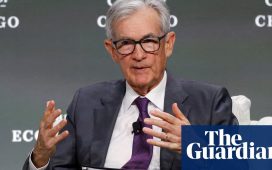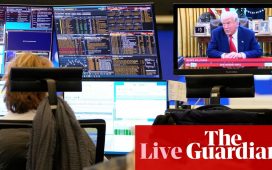Key events
Introduction: Thames Water is lobbying for higher bills and lower fines to avoid bailout, report claims
Good morning, and welcome to our rolling of business, the financial markets, and the world economy.
Thames Water is lobbying the government and industry regulator Ofwat to let it increase household bills, pay dividends and receive lower fines as it seeks to stave off a potential multibillion-pound taxpayer bailout, the Financial Times reported.
Britain’s largest water company is desperately trying to avoid being taken over under the government’s special administration regime.
Last week the government passed updated water insolvency legislation, suggesting the company could be moving closer to a collapse. Officials at the Department for the Environment, Food and Rural Affairs have drawn up contingency plans for the company’s failure, worried that about the consequences if the company collapsed, as it supplies water and sewage services to a quarter of England’s population. The FT said the secret plan to save the firm is called “Project Timber”.
Ministers hope that Ofwat will allow “regulatory easements” such as reduced fines to reduce the financial pressure on the company, the paper reported.
The current situation was described by one insider as “like a flooded room with only an inch of air at the top”. He added: “The shareholders would be irrational to put any equity in if they don’t win concessions.”
Europe’s largest electrical vehicle battery factory will be built in Bridgewater, Somerset, its Indian owner Tata Group has confirmed.
Construction is to begin immediately, and the factory is expected to start producing batteries in 2026. Tata decided to locate the 4bn facility, which is backed by £500m of government funding, at the 620-acre Gravity Smart Campus. It’s the site of a former Royal Ordnance factory that made bombs during World War Two.
Asian shares have lost ground ahead of a barrage of US data on GDP and inflation later. Japan’s Nikkei has slipped 0.08%, Hong Kong’s Hang Seng has lost 1.4% and the Shanghai Composite dropped 1.9%.
Financial markets are now expecting the first interest rate cut from the US Federal Reserve in June, rather than March as anticipated at the start of the year. Traders have pencilled in 77 basis points of cuts against pricing in 150 bps at the start of the year.
The Agenda
-
10am GMT: Eurozone consumer confidence final for February
-
1.30pm GMT: US GDP second estimate and PCE price index for Q4 (forecast: 3.3%)
-
3.30pm GMT: Bank of England policymaker Catherine Mann speech









